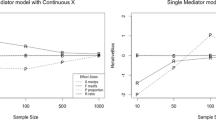Abstract
A mediator variable is a variable that causes mediation in the dependent and the independent variables. The mediator variables play important roles in data analysis which involve several variables, especially when the dependent and independent variables are affected by other variables. Thus, mediation analysis is needed in almost all areas that need regression analysis especially in psychology, business, education, science, engineering area, etc. Mediation analysis has been proposed in many studies. However, sometimes it is much more reasonable to express the data using fuzzy theory when the variables are not clearly defined. For example, it is better to express the mood of a person “bad”, “moderate”, “good” using fuzzy numbers than using real numbers (crisp numbers). In this paper, several fuzzy mediation analysis models have been proposed. And confidence intervals and hypothesis tests are also provided. Several psychological data have been applied to find the total, direct and indirect effect when the mediator and confounding variable exist.













Similar content being viewed by others
References
Zadeh, L.A.: Fuzzy sets. Inf. Control 8, 338–353 (1965)
Kim, I.K., Lee, W.J., Yoon, J.H., Choi, S.H.: Fuzzy regression model using trapezoidal fuzzy numbers for re-auction data. Int J Fuzzy Log Intell Syst 16, 72–80 (2016)
Lee, W.J., Jung, H.Y., Yoon, J.H., Choi, S.H.: Analysis of variance for fuzzy data based on permutation method. Int J Fuzzy Log Intell Syst 17, 43–50 (2017)
Kim, H.K., Yoon, J.H., Li, Y.: Asymptotic properties of least squares estimation with fuzzy observations. Inf. Sci. 178, 439–451 (2008)
Yoon, J.H., Choi, S.H.: Fuzzy least squares estimation with new fuzzy operations. Adv. Intell. Syst. Comp. 190, 193–202 (2013)
Yoon, J.H., Choi, S.H., Grzegorzewski, P.: On asymptotic properties of the multiple fuzzy least squares estimator. In: Ferraro, M.B., et al. (eds.) Soft Methods for Data Science, pp. 525–532. Cham, Springer (2016)
Chen, C., Wen, P., Hu, C.: Role of formal mentoring in protégés’ work-to-family conflict: a double-edged sword. J. Vocat. Behav. 100, 101–110 (2017)
Baron, R.M., Kenny, D.A.: The moderator-mediator variable distinction in social psychological research—conceptual, strategic, and statistical considerations. J. Pers. Soc. Psychol. 51, 1173–1182 (1986)
Hayes, A.F.: Introduction to Mediation, Moderation, and Conditional Process Analysis. Guilford, New York (2018)
Yoon, J.H., Choi, S.H., Grzegorzewski, P. (submitted to Applied Science), On optimal and asymptotic properties of a fuzzy least squares estimator
Puri, M.L., Ralescu, D.A.: Fuzzy random variables. J. Math. Anal. Appl. 114, 409–422 (1986)
Hayes, A.F., Scharkow, M.: The relative trustworthiness of inferential tests of the indirect effect in statistical mediation analysis does method really matter? Psychol. Sci. 24, 1918–1927 (2013)
Sobel, M.E.: Asymptotic confidence intervals for indirect effects in structural equation models. Sociol. Methodol. 13, 290–312 (1982)
Cole, M.S., Walter, F., Bruch, H.: Affective mechanisms linking dysfunctional behavior to performance in work teams: a moderated mediation study. J. Appl. Psychol. 93, 945–958 (2008)
Diefendorff, J.M., Mehta, K.: The relations of motivational traits with workplace deviance. J. Appl. Psychol. 92, 967–977 (2007)
Felps, W., Mitchell, T.R., Byington, E.: How, when, and why bad apples spoil the barrel: negative group members and dysfunctional groups. In: Staw, B.M. (ed.) Research in Organizational Behavior, vol. 27, pp. 175–222. Elsevier, Amsterdam (2006)
Robinson, S.L., O’Leary-Kelly, A.M.: Monkey see, monkey do: the influence of work groups on the antisocial behavior of employees. Acad. Manag. J. 41, 658–672 (1998)
Duffy, M.K., Ganster, D.C., Shaw, J.D., Johnson, J.L., Pagon, M.: The social context of undermining behavior at work. Organ. Behav. Hum. Decis. Process. 101, 105–126 (2006)
Pollack, J.M., VanEpps, E.M., Hayes, A.F.: The moderating role of social ties on entrepreneurs’ depressed affect and withdrawal intentions in response to economic stress. J. Organ. Behav. 33, 789–810 (2012)
Garcia, D.M., Schmitt, M.T., Branscombe, N.R., Ellemers, N.: Women’s reactions to ingroup members who protest discriminatory treatment: the importance of beliefs about inequality and response appropriateness. Eur. J. Soc. Psychol. 49, 733–745 (2010)
Acknowledgements
This research was supported by Basic Science Research Program through the National Research Foundation of Korea (NRF) funded by the Ministry of Education (NRF-2017R1D1A1B03034813).
Author information
Authors and Affiliations
Corresponding author
Rights and permissions
About this article
Cite this article
Yoon, J.H. Fuzzy Mediation Analysis. Int. J. Fuzzy Syst. 22, 338–349 (2020). https://doi.org/10.1007/s40815-019-00727-6
Received:
Revised:
Accepted:
Published:
Issue Date:
DOI: https://doi.org/10.1007/s40815-019-00727-6




